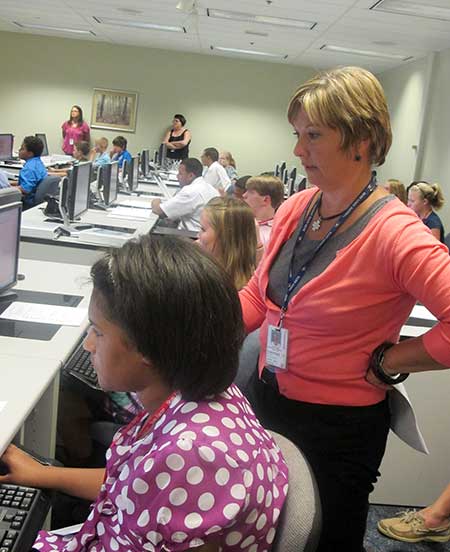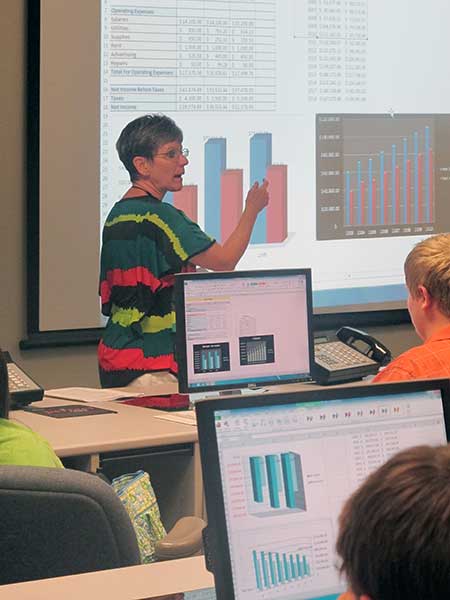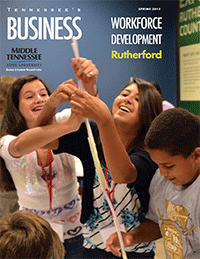Business Education Partnership:
Linking Classroom Curriculum to the Real World
|
A young man from a single-parent home with little means for acquiring a postsecondary education participates in Job Shadow Day where he impresses an executive at a state-of-the-art manufacturing plant with his honest desire to better himself. He is offered a job by that executive upon completing high school with the potential opportunity to study for the degree of his dreams in engineering technology paid for by the company. During the summer after completing seventh grade, a young girl participates in State Farm Summer Business Camp, where she and her teammates struggle over in-depth income statements for a business plan competition in which each member of the winning team receives a laptop computer. Even though her team doesn't win, she comes to realize that she gained knowledge that would last a lifetime. She had "connected the dots" between school curriculum in math and economics and the real world, which made these subjects "a breeze," putting her ahead of her classmates academically. During Professor Buzzo Discovery Academy, 30 elementary school teachers learned how to use the "Chemistry of Cookies" and the "Math of Project Runway" to introduce new, more rigorous state curriculum standards for math and science into their classrooms. Hands-on activities involving life skills and students' interests showed teachers how integral math and science are to our everyday lives. Activities such as these make learning fractions, decimals, and percentages fun for students while helping them gain a general math sense that business leaders find lacking in current graduates. "Students learn new concepts best when they understand how curriculum applies to their lives and future jobs," said Dr. Linda Gilbert, Director of Murfreesboro City Schools. "Our goal is to help students and teachers see how what is taught in class is applied in business so our future workforce is better prepared for the challenges before them." "Currently, the most critical area for middle Tennessee, as well as the entire country, is to enhance science, technology, engineering, and math (STEM) education. We have created a new age of business, and our students are not coming out of school prepared to support it," said Dr. Tom Cheatham, director, Tennessee STEM Education Center, Middle Tennessee State University. "The BEP has created professional development programs for teachers and counselors and business and leadership programs for students which address these critical issues." We live in exponential times that are making the world smaller. Computers, the Internet, and other forms of electronic communication are changing the way we do business and with whom we do business. These tools are also making huge changes in the manufacture of durable goods, how these goods are distributed, and even how we sell these goods. Business is getting faster as technology makes processes leaner. Competition for jobs is no longer regional or even national but international. For almost 25 years the BEP Foundation has been working with Murfreesboro City and Rutherford County schools to create a bridge between the worlds of education and business so classrooms are providing students with the lessons they need to succeed in this constantly changing business and manufacturing environment. More and more educators are going to have to prepare their students for a job market and a way of life they do not understand and often cannot even conceptualize. Our education system was created to support the Industrial Revolution, which took place over 100 years ago. But our current revolution is being created by the massive technological shift changing every facet of our lives. Manufacturing is experiencing the greatest upheaval. Over 4,000 skilled labor jobs are open in Rutherford County in spite of the current recession, yet we do not have people with the technical skills to fill these jobs. Many of these jobs have entry-level pay of $50,000 after only two years of postsecondary education. Recently a group of school guidance counselors along with their principals and assistant principals, through a BEP Foundation program called Counselor Leadership Institute (CLI), spent part of a day at the new Bridgestone Mechatronics Edu-cation Facilities run in coordination with Motlow Community College. The goal of CLI is to make educators aware of current human resource needs, job trends, and educational requirements, including "soft skills." At Bridgestone a panel of managers explained the critical need for skilled workers and the opportunities available to their students. "We are working very hard in industry and especially manufacturing to change the image and perception that people have of our business," stated Keith Hamilton, manager of Bridgestone's North American Mechatronics Education Center. "We want to raise awareness of what jobs are like in modern manufacturing and how a career in one of the technology fields is a great opportunity for young people. So we want to reach out to educators to be our partners in sharing this information with their students and the parents of their students. We believe that having the support of educators and having them as a partner is essential to the long-term strategy of growing the workforce locally, and in the end this will benefit all of our citizens in the great state of Tennessee." As a counselor at Oakland High School, Mary Richardson sees the importance of growing this relationship with Bridgestone and other manufacturers. She notes that the partnership between manufacturing and education is great news for students because this field of study is going to be in high demand for the next 10 years due to the number of Baby Boomers retiring and the constant advancement in technology that is changing the face of manufacturing and creating even more tech-skilled jobs. While high-tech job training is a high-priority focus, it is not the only area in which the BEP works with local school systems. This organization is also working to prepare tomorrow's leaders through Youth Leadership Rutherford and State Farm Summer Business Camp. Youth Leadership Rutherford is a selective civic-engagement and personal-development initiative for high school juniors and seniors. Participants learn about the community, economic, educational, and governmental structure and interactions within the county as well as participating in leadership- training activities, completing a group service project for a local nonprofit, and keeping a journal detailing their personal-development journey during the year-long program.
State Farm Summer Business Camp is an entrepreneurial academy for middle school students that introduces them to the world of business and economics though hands-on activities, workshops, and tours of local business and manufacturing. "In my current role managing finances and operations of a charter school, I've used a great deal of knowledge and skill sets I learned from both Youth Leadership Rutherford and State Farm Summer Business Camp that are absolutely essential to my job," noted Charity Hemphill Frierson, who was in the first Business Camp class 12 years ago. "Since I work in education, compliance with local, state, and federal regulations is crucial. My experiences in Youth Leadership Rutherford gave me a good starting point to understand how government agencies are organized and the types of challenges they typically face. This insight has given me more rapport with our contacts in those places." Hemphill-Frierson brings up the key to building the bridge between the worlds of education and business: developing understanding. The BEP works to create this understanding through programming that brings about interactions and dialogue between business, students, and educators. "Business Camp showed me that people are the key to achieving any goal a person chooses to pursue, whether in business or their personal life," noted James Gibson, another first-year Business Camp graduate. "It is important to understand people in general and especially the people you interact with on a regular basis. Communication is the key to that understanding." Gibson sums up the foundation's purpose well. All of the examples of BEP Foundation programming discussed here are the result of bringing people together to share knowledge and skills to ensure the continued economic growth of Rutherford County by teaching our students the skills they need to succeed with all the changes created by the technological revolution we are experiencing. For more information on BEP, its programming, and a lesson plan resource for teachers, visit www.rutherfordbep.org. * Lee Rennick is executive director of the Business Education Partnership Foundation. |
|
 Students in State Farm Summer Business Camp use EXCEL spreadsheets in their mock-business financial plans.
Students in State Farm Summer Business Camp use EXCEL spreadsheets in their mock-business financial plans. State Farm's Debbie Bogle teaches Summer Business Camp students to use charts and graphs in the business plan competition.
State Farm's Debbie Bogle teaches Summer Business Camp students to use charts and graphs in the business plan competition.